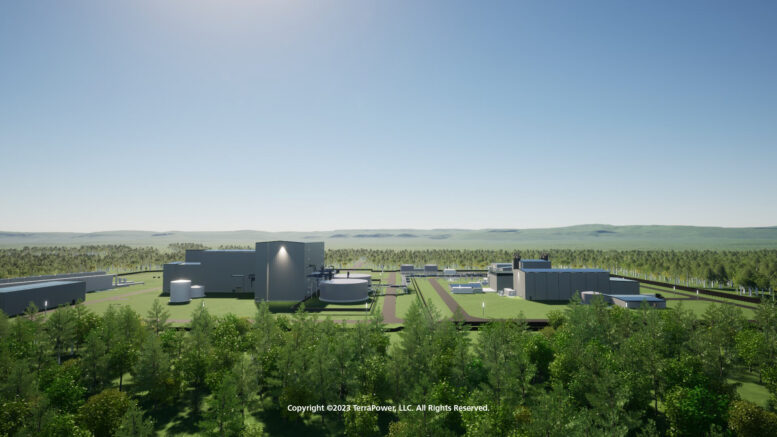Colorado Gov. Jared Polis signed a bill Monday that redefines nuclear energy as clean energy under state law, opening the market significantly to potential power projects and defying a wide range of environmental organizations that had sought a veto.
The Democratic governor, who’s pushed adoption of more sources of clean energy ranging from hydrogen to geothermal, signed House Bill 1040 quietly, mentioning he inked it and seven other bills administratively at the end of a news release highlighting three other new laws. He added just one sentence to the description of the bill, noting it was bipartisan.
That bipartisanship was the key in turning a failed two-year effort from Republican Sen. Larry Liston of Colorado Springs — similar nuclear bills died in their first committees in 2023 and 2024 — into one that passed the House 43-18 and the Senate 29-5. Liston sought out and brought on as a primary co-sponsor Rep. Alex Valdez, a Denver Democrat and author of numerous renewable-energy laws who said this year that he no longer believed Colorado could achieve its emissions-reduction goals without nuclear energy.
Valdez and cosponsoring Rep. Ty Winter, R-Trinidad, then pushed a two-part argument in which Valdez appealed to conservationists and moderate Democrats that nuclear plants are clean and low-risk and can create many union-supported jobs. Winter, meanwhile, argued that with Colorado regulations making it a less attractive place for oil and gas development, nuclear can serve as a suitable job replacement and be a part of the all-of-the-above strategy the party has been calling for the state to adopt.
How the bill promotes nuclear development
“I’m excited to add Colorado to the list of states that are open to all forms of clean energy,” Valdez, who had noted repeatedly that 28 other states get some of their power from the nuclear energy, told The Sum & Substance on Monday. “As our energy demand continues to skyrocket, we will need to harness safe and trusted methods like nuclear to meet our goals. It’s a big win for all Coloradans who like clean air and inexpensive electricity.”
The signing of HB 1040 doesn’t mean that Colorado will become home to nuclear projects anytime soon, but it opens the door to potential developers of small modular reactors by signaling the state’s willingness to accept them. By redefining nuclear as “clean energy,” it give such projects access to financing options like low-interest loans, and it allows utilities to count nuclear energy toward the minimum renewable-energy percentages they must include in their portfolios.
This change could have the most immediate impact on communities like Pueblo and Craig that are shuttering coal-fired power plants and are desperate to find a replacement fuel source to create the high-paying jobs they say that wind and solar energy can’t supply. In Pueblo, Xcel Energy is set to close its Comanche 3 power plant by 2031, 40 years ahead of its original life schedule, and leave a $200 million hole in the region’s economy.
Environmental pushback
HB 1040 got a boost from leaders in both of those communities and from several unions who testified that the nuclear sector was a job producer in other states. Valdez, Liston and others emphasized there’s never been a fatal nuclear incident in the United States, even with constant shipments of spent nuclear fuel via railways, in trying to push the industry’s image past that which was created by the 1986 Chernobyl disaster.
Most environmental groups — including a coalition of 24 organizations that asked Polis in a letter to veto the bill — pushed back against the idea that nuclear is clean, however. They argued that nuclear waste will remain radioactive for thousands of years and that mining and enriching of uranium, as well as construction of nuclear reactors, creates significant carbon emissions, challenging the notion that the energy is emissions-free.
Opponents also argued that nuclear costs are far higher than wind or solar — so high that some utilities in other states have canceled plans to develop small modular reactors — and that bringing such plants online will exact a heavy price on utility customers. Finally, they argued that small nuclear reactors can use more than 160 million gallons of fresh water daily, exploiting a resource that already is too scarce in Colorado.
Backers of nuclear win out
“The bottom line is that nuclear energy corporations and major utility companies would reap all the profits, while Colorado’s frontline communities would absorb all the risks, health impacts and environmental contamination,” groups like GreenLatinos and Sierra Club Colorado wrote in the veto request. “Given the rapidly diminishing costs in renewable technologies which have shown great promise in tackling the climate crisis, a transition to nuclear power would be a ludicrous waste of time, money and energy for our state.”
Polis has spoken of job creation, energy innovation and environmental protection as priorities, and in this case, he clearly felt that the interests of the state lay much more in promoting nuclear energy than in putting obstacles in the way of efforts to develop it here. Time will tell exactly how much HB 1040 incentivizes nuclear production, but for now, Colorado is showing a clear green light to developers of the energy source, much to the excitement of Liston, who for many years felt like its only local cheerleader.
“If we ever want to meet the energy demands of the 21st century, we need to explore every energy source we can. Nuclear energy is the solution we need,” Liston said in a statement, adding that he wished the bill had gotten the public signing he felt it deserved. “I especially want to thank the numerous stakeholders, experts and clean-energy advocates who have supported my efforts over the past three years. It took substantial work, but we finally got it across the finish line.”
